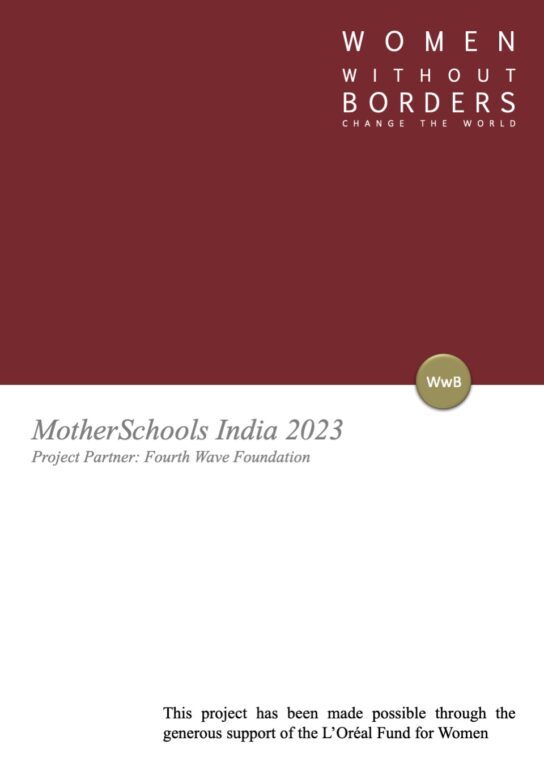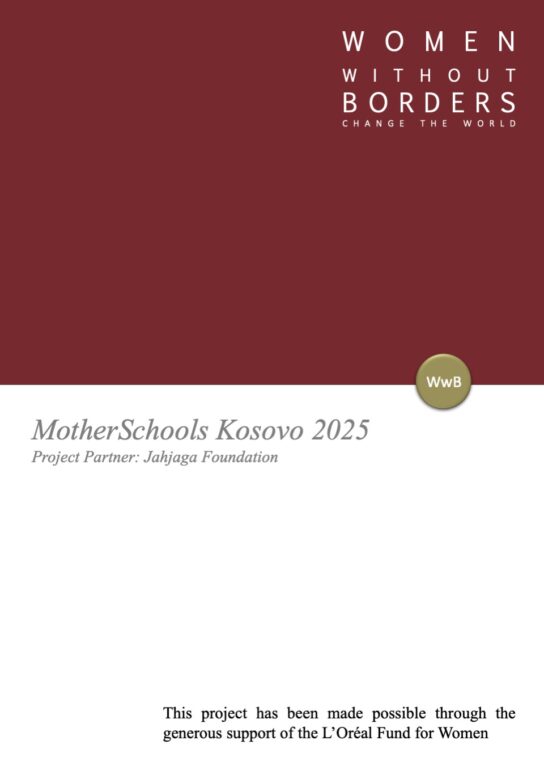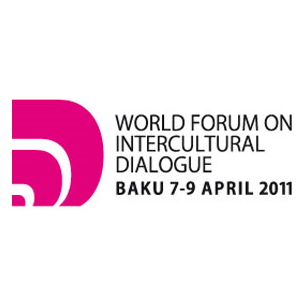Between 2021 and 2023, WwB implemented its ‘MotherSchools: Parenting for Peace’ Model in Kerala, India with its local partner Fourth Wave Foundation. The programme in Kerala, which is part of a multi-country project supported by the L’Oréal Fund for Women, saw fifteen groups convene over the course of three years across five municipalities. This impact report offers an overview of the MotherSchools project in India, introduces WwB’s impact model, and presents the impact findings based on quantitative and qualitative data from the perspectives of project stakeholders, including Participants, Teachers, and Notetakers.
Violence is prevalent across India, largely driven by political and religious divides, and these tensions in the population are exploited by politicians as well as extremist groups, leading to outbursts of violence. In recent years, there has been a rise in both Hindu nationalist sentiment and sympathy for Islamist extremism. This has manifested itself in violent riots and terrorist attacks carried out by both sides, notably the 2002 Gujarat riots and the 26/11 attacks in Mumbai. Violent attacks targeting Muslims have occurred as recently as 2020 and 2022. The Bharatiya Janata Party (BJP), which received a landslide victory in India’s 2019 election, continues to stoke tensions with its pursuit of Hindu nationalist policies. At the same time, with the rise and fall of ISIS and ongoing tensions in Jammu and Kashmir, there have been cases of Islamist extremism. Furthermore, there is a concern that growing anti-Muslim sentiment driven by Hindi nationalists could fuel Islamist violence. Notably, Jihadist terrorism is no longer specific to Jammu and Kashmir, but has spread across India, with Mumbai, Bangalore, Hyderabad and New Delhi all being targets of terrorist attacks in recent years. Young people are particularly susceptible to messaging by extremists, especially given the use of social media and the internet as tools for radicalisation. Cutting across all sections of society, however, is the continued rise of violence against women in India. This trend is particularly worrying, as crimes typically affecting women, such as domestic violence, rape and so called ‘honour’ killings, are associated with shame, meaning they are underreported and victims live in fear of stigmatisation. The violence experienced by women, both in public and in their own homes, is a serious threat to security in India, reinforcing cycles of violence.
Executive Summary: Participant Perspectives
Below is an overview of some of the key findings from the perspective of the Participants who went through the programme, receiving approximately 40 hours of training in PVE (preventing violent extremism), childhood development, security, peacebuilding, and communications.
Confidence | Prior to MotherSchools, Participants expressed that they could not share their own opinions in their families or communities. Through the sessions, Participants conveyed that they felt an increased sense of agency and realised the value of their voice in contributing to daily life and decision making.
Competence in Parenting | Participants had previously felt a distance to their children and disclosed a lack of knowledge to address this. Following MotherSchools, they expressed feeling equipped with the skills needed to support their children through the different stages of development.
Competence in Preventing Drivers to Violence and Extremism | While Participants were concerned about their children becoming involved with drugs or following the wrong path, they lacked prevention methods. They shared that in MotherSchools they learned to recognise the role they may play in pushing their children further away and now feel ready to implement tools to safeguard their children.
Applying the Knowledge | An atmosphere of silence, isolation, and miscommunication was previously present in families. Since attending MotherSchools, Participants communicated how they have been making a concerted effort to strengthen the bond with their children and foster an environment of mutual respect.
Breaking the Silence | Before attending the sessions, Participants lacked the courage to speak out and feared the consequences if they did. They indicated that they are now raising their voices and cultivating open communication, providing a safe space for their children to learn.
Leadership | Participants had previously lacked the agency to take action. After experiencing the safe space of MotherSchools, they voiced feeling empowered to spread the knowledge they have learned and to lead others in responding to violence and problems they witness.
Trust | Past experiences of mistrust in their communities were holding Participants back from sharing their concerns with others. Having built trusted relationships in MotherSchools, they declared that they can now recognise the value of opening up and are witnessing increased trust in their families.
Norms | Women are expected to keep to their prescribed roles and stay silent on the matter of domestic violence. After MotherSchools, Participants disclosed that they are taking time for themselves and are empowered to change the norm of suffering in silence for their children.
Networks | Prior to MotherSchools, Participants often felt isolated in their homes and were lacking a supportive space for sharing and open dialogue. MotherSchools filled this void and produced a group strength, which Participants asserted is vital for effecting change in their communities.
To read more on the impact of MotherSchools India 2021-2023, read the full report.




